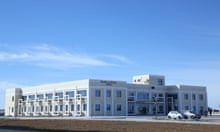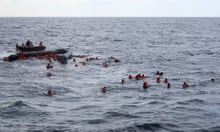Child refugees are facing abuse and malnutrition in a network of 26 Libyan detention centres the British government is helping to fund, the Guardian has learned.
In the first accounts to the media from minors being held in the camps, the children described being starved, beaten and abused by Libyan police and camp guards. One said the conditions were like “hell on earth”.
According to documents seen by the Guardian, there are 26 active camps which are part-funded by the UK across Libya. While the existence of the camps had previously been reported, the scale of the network was not public. There are no exact figures available on the number of children being held but there are thought to be hundreds and possibly more than 1,000. There are at least 5,400 refugees and migrants being detained in total, the UN Refugee Agency (UNHCR) says.

The Department for International Development confirmed the government was contributing funds for the centres: “We continue to help fund the European Union Trust Fund’s work to improve conditions for migrants in detention centres.”
The government insists the funding is necessary as part of a humane effort to dissuade people from making the dangerous Mediterranean crossing. Arguing that migrant detention centres are the responsibility of the Libyan authorities, it is understood to have raised concerns over the treatment of detainees with the Libyan government.
But critics see the Libyan camps as a way for European countries to outsource their problem with migrants and asylum seekers and contend that they are implicated in the problems with a system they fund “to make sure they don’t get to Europe”.
The revelations from the children – who risk severe punishment if guards discover they have been speaking to the media – provide the most detailed account yet of life in the camps for minors. Earlier this month, Amnesty International said conditions in the detention centres were unsustainable and that torture and ill-treatment were rife.
“There is a callous disregard on the part of Europe and other states for the suffering of those languishing in detention centres,” the Amnesty report said.
A 16-year-old boy in one of the centres said: “I have been here for four months. I have tried to escape three times to cross the sea to Italy but each time I have been caught and brought back to the detention centre. We are dying here but no one is taking responsibility. We need to be taken to a place of safety but we are locked in here 24 hours a day. We do not see sunrise and we do not see sunset.”
The centres are designed to keep asylum seekers from crossing the Mediterranean to Europe. The UK and other EU countries have spent tens of millions trying to prevent asylum seekers from conflict zones, such as Eritrea and Sudan, entering the region. Last year the UK government spent £10m in Libya on various initiatives, including the detention centres.
Critics see the work as part of the government’s former “hostile environment” migration policy, intended to deter people from seeking sanctuary in the UK as well as removing those who were already in the country.
A 13-year-old Eritrean asylum seeker in a Tripoli camp told the Guardian detainees got just one or two small portions of white pasta a day and many were starving and malnourished. Diseases such as TB were rife. Many possessed just one T-shirt and one pair of shorts and were freezing now temperatures were dropping.
“I am very scared and very hungry,” the boy said. “I want to reach the UK where I will be safe. We have nothing here, no food, no clothes, no phones. I miss my mother and father so much.”
A 30-year-old Eritrean asylum seeker in the camp said the boy had travelled from Eritrea via Sudan with a 16-year-old cousin.
“He cries all the time for his parents,” she said. “He is so sad I let him go to sleep with me. The conditions here are so bad. We are treated like donkeys, not like human beings. We are not allowed to have phones so we have to hide them when the police come.”
This week a 24-year-old refugee tried to hang himself in the toilet area of one of the camps, a 16-year-old in the same camp said. Three others saw him and quickly cut him down. He survived.
The teenager said his friend had lost hope because he was registered with UNHCR in January 2018 but was still languishing in the detention centres.
In a message sent late on Monday evening he said: “All the refugees are waiting to do like what our bro do cos they suffered long time. Libya is hell on earth. The world never help us and see our problem.”

One 17-year-old Eritrean boy who escaped from a detention centre and reached the UK has claimed asylum. An expert medical report found almost 50 torture scars on his body, consistent with being beaten with batonsand sticks. In a witness statement the boy said some of the injuries were sustained in beatings from guards at the camp, and others from traffickers. Many of those in the camps are from Eritrea but there are also asylum seekers from Ethiopia, Iraq, Somalia, Sudan and Syria.
The policy to keep out as many asylum seekers as possible by holding them at key crossing points into Europe appears to be working. In the year ending March 2018, the number of asylum applications in the UK from main applicants decreased by 8% to 26,547. The falls are consistent with the wider trend across Europe, with a decrease of around 41% in applications to EU countries in the last year.
Giulia Tranchina, of Wilsons solicitors, who is representing the 17-year-old Eritrean boy in London, said: “What young men, women, children and babies are suffering in detention in Libya is one of the biggest failures of our human civilisation. European governments, in our name, with our taxpayers’ money, are paying Libyan authorities, militias and army generals to continue detaining and torturing refugees on our behalf, to make sure they don’t get to Europe.”
A spokeswoman for UNHCR said: “We remain incredibly concerned about the plight of detained refugees and migrants. Conditions in detention are extremely dire.”
She said the current figure of 5,409 refugees and migrants being detained in Libya did not include those being held captive by smugglers.
A DfID spokeswoman said government funding was also used to encourage migrants to return to their home countries, for emergency evacuations of refugees, and for healthcare. UK government officials had raised with their counterparts in the Libyan Government of National Accord the need to respect the human rights of migrants, ensure the provision of basic services and explore alternatives to detention centres, she said.










